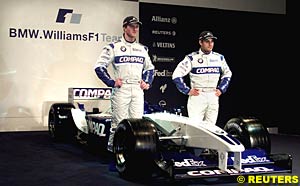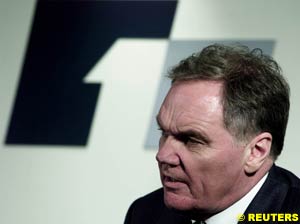
Atlas F1 Senior Writer
Karl Ludvigsen went to the Williams 2002 launch at the end of last week, on behalf of Atlas F1. He returns with several insights on what Williams are facing this year and just how well they are prepared for their rise to the top
So Williams is used to winning. And winning both races and Championships. In seven straight seasons, from 1991 through 1997, Williams gobbled up triple-digit points totals. Nobody else can make that statement. Ferrari now stands on five consecutive triple-digit seasons, and will certainly be at six by the end of 2002. McLaren is now at four, the most it has ever managed consecutively, and last year was a squeaker with only 104 points. You can bet that from its 80 points last season BMW-Williams would like to be back in triple-digit territory this year.
The team has identified how to do this: better reliability. In its 34 starts in 2001 its cars finished only 16 times - less than an 0.500 average. At his new car's launch, Williams's co-owner and technical director Patrick Head discussed the reasons. Driver problems affected the season's early races, he said, his own and other drivers'. Head laughed off the idea that some peculiarity of his car's aerodynamics was responsible for their being hit up the back three times in the first three races. More to blame, he thought, was rusty early-season driving after a winter's lack of wheel-to-wheel racing. "The better a car handles," he added, "the less likely a driver is going to make a mistake driving it." With a BAR and an Arrows accounting for two of the attacks, wonky handling might well have been to blame.
"Up to Monaco," Head added, "we had quite small problems with the car." Small they were - nothing major was breaking - but they were enough to force five retirements in the first seven races. Pulling itself together, the team got on top of these and had only one car failure the rest of the season. But no sooner was the car surviving than BMW's engines started breaking. Engines caused four retirements in five races in a row. "BMW got on top of that very quickly," said Head. I'll say. They proceeded to win at Monza, one of the hardest tracks on engines, and wrapped up the season in fine fettle.
BMW is making no small commitment toward this goal. Werner Laurenz and his 20-man team started on this year's engine design a full year ago. The first P82 was ready to run on the dynamometer on September 21st and astonishingly soon, on October 3rd, it was being tested in a car. In the last opportunities before the winter testing ban, it was tested at various circuits in last year's Williams. That gives BMW a strong head start on reliability.
Working together, BMW and Williams are now throwing heavy testing at their cars. To get added mileage for both engine and car plus tire work with Michelin, they tripled up their test cars in January with the help of contracted test drivers Marc Gene and Antonio Pizzonia. By the end of January, said operations director Sam Michael, they will have covered as much mileage as they did in both January and February of last year - something like 60% more car-days of testing than in 2001. If that doesn't spell reliability, I don't know what does.
Nor has Sam Michael ignored his side of the team. "We took a good hard look at everything we did last year," he said, "and there were some areas where we were clearly not up to scratch. We've changed people around on the pit staff." Sounds to me like some serious benchmarking has been going on. We can expect to see tighter, snappier pit performance and shrewder race strategy from BMW-Williams.
None of the above is meant to imply that the team is approaching 2002 in a cocksure state of mind. Patrick Head stressed that all the same uncertainties reign as they have in every season, especially because you never know how much progress the opposition has made. Here, however, he saw a real benefit from McLaren's switch to Michelin tires: "It's an advantage to have another very strong team on Michelin as well." Jaguar did not exactly set a demanding standard. McLaren's pre-season times on similar tires will provide BMW-Williams with a much clearer idea of the way the races are likely to go.
Of course, Formula One racing being what it is, all these well-laid plans could go for naught. The cars could start spouting hydraulic fluid in every direction and Gavin Fisher's new FW24 could be a slug. Somehow, though, I doubt it. I see another season of triple-digit points ahead for Williams - the first of many.
* * *
I can't resist relating a comment that Patrick Head made during the Williams launch. It reminded me of the column I wrote after last year's Japanese Grand Prix, in which I wrote about some remarks to the effect that Rubens Barrichello was hired on purpose to allow Michael Schumacher to garner all the points for Ferrari. Said Patrick, "I don't think it's a deliberate choice by Ferrari to choose a slow driver for the second car." Neither did or do I! And this is the season in which Rubens must show just what he can do.
In its 2001 season, BMW-Williams scored four wins. Although as a performance that would seem awfully good to such as BAR, Jordan and Jaguar, to name only a few, it isn't up to the Williams standard. That's a share of wins of 23.5% from the 17 race starts of the 2001 season. Although amounting almost to one win in every four races, its 2001 hit rate - believe it or not - brought down the Williams average! According to FORIX, since the team's founding it has won 107 times in 395 starts. That's an astonishing average of wins in 27.1% of Williams's race starts.
 Nobody else currently active in the sport has done as well. McLaren isn't too shabby, considering the team's ups and downs over the years. Its average is 25.5% wins from its race starts. Ferrari trails with 22.1% over its long history. These three teams tower over all others in the modern sport, for obvious reasons. From the 1950s two teams stand out. One is Vanwall, which won 32.1% of its 28 race starts. The other, of course, is Mercedes-Benz, which started only a dozen races in 1954-55 and won 9 for a 75% average! Unless Toyota is a much bigger surprise than we expect, we won't be seeing the likes of that for a while.
Nobody else currently active in the sport has done as well. McLaren isn't too shabby, considering the team's ups and downs over the years. Its average is 25.5% wins from its race starts. Ferrari trails with 22.1% over its long history. These three teams tower over all others in the modern sport, for obvious reasons. From the 1950s two teams stand out. One is Vanwall, which won 32.1% of its 28 race starts. The other, of course, is Mercedes-Benz, which started only a dozen races in 1954-55 and won 9 for a 75% average! Unless Toyota is a much bigger surprise than we expect, we won't be seeing the likes of that for a while.
 With its new P82 V-10 an evolution of its P80 of last year, BMW has every chance to get on top of its reliability right from the start of the season. This, said Ralf Schumacher, is what's needed for a successful year: "Most important for the first two races is reliability." "We're no longer beginners," said BMW engine man Dr. Mario Theissen, "but we still haven't got the reliability that is needed to remain consistently at the front. That's why our brief for 2002 has 'improved reliability' spelled out in bold letters."
With its new P82 V-10 an evolution of its P80 of last year, BMW has every chance to get on top of its reliability right from the start of the season. This, said Ralf Schumacher, is what's needed for a successful year: "Most important for the first two races is reliability." "We're no longer beginners," said BMW engine man Dr. Mario Theissen, "but we still haven't got the reliability that is needed to remain consistently at the front. That's why our brief for 2002 has 'improved reliability' spelled out in bold letters."
Please Contact Us for permission to republish this or any other material from Atlas F1.
|
Volume 8, Issue 5
Atlas F1 Exclusive
The FIA's Court of Appeal: Final Answer?
Williams 2002: Improving the Average
Articles
Miracle at Imola
Columns
Rear View Mirror
Bookworm Critique
The Weekly Grapevine
> Homepage |